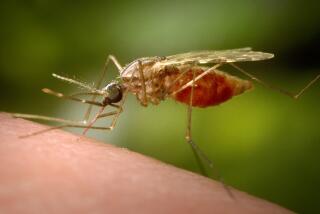2 Chimps Immunized Against AIDS, Firm Says : Disease: Researchers are encouraged, but believe a safe and effective vaccine for humans is at least 10 years away.
- Share via
Genentech Inc. of South San Francisco announced Friday that its scientists had successfully immunized two chimpanzees against infection with one strain of the AIDS virus.
Such results, as well as similar successful tests of vaccines against AIDS-like viruses in monkeys, demonstrate that a vaccine to protect humans against the deadly disease is possible, scientists say. But many AIDS vaccine researchers believe that it will take at least another decade to develop a safe and effective vaccine for widespread use.
Genentech claimed in a press release that its experiment, which has yet to be published in a medical journal, “for the first time demonstrates that vaccination can provide protection from human immunodeficiency virus infection.”
But in recent months two other research groups--one at the Pasteur Institute in Paris and the other at Immuno AG in Vienna have made the same claim after chimpanzee tests using different vaccine preparations. The Austrian announcement was made at a medical meeting in Vienna in March and the Pasteur data was reported at a medical meeting in Colorado in April.
When informed by a reporter of these other unpublished claims, Genentech spokesman Jack Murphy said, “Perhaps we should withdraw our claim to being first.”
The Genentech experiment, conducted in collaboration with the Southwest Foundation for Biomedical Research of San Antonio, involved three chimpanzees. Two were immunized with a genetically engineered AIDS vaccine made from a protein on the surface of the AIDS virus, known as gp 120. The other served as a control.
The three chimpanzees were challenged with the same laboratory strain of the AIDS virus from which the protein was derived, the company said. The unvaccinated control animal became infected within seven weeks. But after six months, the two immunized chimps remained free of infection.
The success provides “encouragement that an AIDS vaccine may one day be developed, but work on this project, if successful, will take several years,” Genentech spokesmen said. The company added that it “is working toward the goal of initiating human clinical trials” but provided no specifics.
Genentech said it announced its results before their scheduled publication in the British scientific journal Nature on June 14 because of a pending shareholders’ vote on a proposed merger with Roche Holding Ltd. of Switzerland, the parent company of the pharmaceutical firm Hoffman-La Roche of Nutley, N.J. That vote is scheduled for next Friday.
“We just thought that it would be good before the meeting to discuss everything that is a major development project,” Genentech’s Murphy said.
“The request was very unusual but we agreed,” said Penelope Walker of Nature’s Washington office. Biomedical journals normally have strict policies against pre-publication news media publicity. Journal editors frequently complain that such publicity, when compared to the actual scientific report, may be hyperbolic and misleading.
Genentech said that “a better understanding of the mechanism of protective immunity is necessary before significant progress can be made” toward an AIDS vaccine. This includes understanding how to use one vaccine to protect individuals against infection with the many different strains of the AIDS virus.





